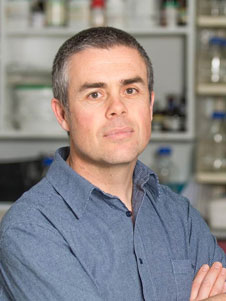 Monday 29 May 2017 9:52am
Monday 29 May 2017 9:52am
Dr Logan Walker
A University of Otago, Christchurch, discovery of missing DNA in women who develop breast cancer at a young age could hold the key to helping them beat the disease.
Dr Logan Walker says he studied the DNA of hundreds of Australian women aged under 40 who had developed breast cancer. This was a collaborative study with scientists from the University of Melbourne.
“We were trying to find genetic causes for why these women developed the disease at such an early age.”
His surprising finding: the women 'missed' certain bits of their DNA.
“We think these pieces of DNA that are missing may have overlapped genes or involved genes that have contributed to the early onset of breast cancer.”
Walker says he hopes the finding could one day identify women at risk of developing cancer at a young age, and improve treatment and survival rates.
“If we can identify the genes that underlie risk, or the sorts of things that cause disease in these young women, then we can potentially identify those women before the disease has occurred, and if we can do that we can minimise the risk of or prevent the disease from occurring in the first place.
The findings were published in the international journal, Breast Cancer Research.
Walker says to confirm the findings of his study, the DNA of tens of thousands of women from around the world should be checked.
This is possible for Walker as he is New Zealand's only collaborator with the world's best collection of breast cancer geneticists - CIMBA (Consortium of Investigators of Modifiers of BRCA1/2) and BCAC (Breast Cancer Association Consortium). Through links with these groups, Walker is able to access the genetic profiles of tens of thousands of women worldwide.
Walker says approximately, 170 women aged under 40 develop breast cancer in New Zealand each year.
“Genetic testing typically shows that 10 per cent of young women who develop breast cancer have inherited a mutation in known breast cancer susceptibility genes - the most widely publicised being BRCA1 and BRCA2. This leaves the majority of the young women with no explanation. We are trying to change this through our work in collaboration with large international studies using cutting-edge DNA analysis tools.”
The study was funded by the Health Research Council and Dr Walker's Rutherford Discovery Fellowship from the Royal Society of New Zealand.
For further information, contact:
Kim Thomas
Communications Manager
Txt: 027 222 6016
Email: kim.thomas@otago.ac.nz
A list of Otago experts available for media comment is available elsewhere on this website.
Electronic addresses (including email accounts, instant messaging services, or telephone accounts) published on this page are for the sole purpose of contact with the individuals concerned, in their capacity as officers, employees or students of the University of Otago, or their respective organisation. Publication of any such electronic address is not to be taken as consent to receive unsolicited commercial electronic messages by the address holder.
